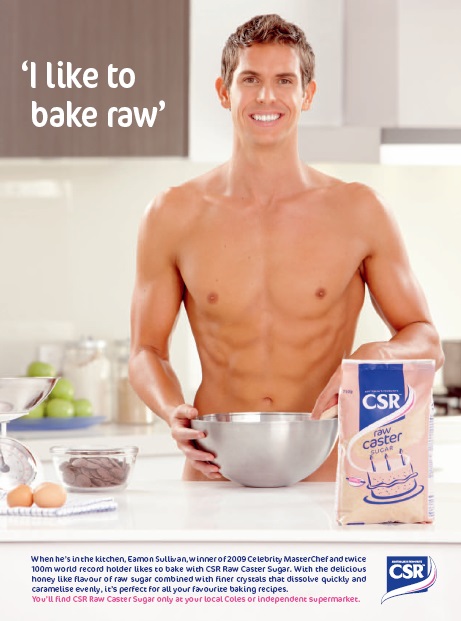
I’m not very good with subliminal advertising, but (apparently) eating sugar makes you look like Eamon Sullivan – which I guess would be good. Or perhaps it just makes you take your clothes off – not so good (in my case). Either way, the latest CSR sugar advertisement sends a pretty damn (‘scuse French) irresponsible message about sugar.
The purpose of the ad is to sell CSR sugar. And so I guess the reason they didn’t use a nude Matt Preston (for example) was that they wanted us to believe that eating CSR sugar would give us (or our significant other) abs like Eamon’s.
Maybe I’m just jumping to conclusions. Maybe Eamon always noods-it-up for a spot of baking (although I can’t say I noticed that when he won Masterchef). But there’s no shortage of research to tell us that eating sugar (in our birthday suit or fully clothed) is the single least effective way to get a washboard stomach.
And you don’t need to look too hard to find that science. Even CSR’s own website warns us “There is some evidence to suggest that [the fructose half of sugar] is handled differently in the body and may be associated with obesity and other health issues.”
Eamon must have missed the memo (that sugar makes you fat) because when asked about his role in the advertisement, he is quoted as responding “statistics showed that while obesity rates were rising, sugar consumption was falling.”
Really? What statistics would those be? The only ones I could find show exactly the opposite (a consumption increase of over 50 per cent since 1990). But that data is maintained by the Australian Government’s Bureau of Agricultural and Resource Economics (ABARE) – what would they know?
Eamon went on to say “the CSR sugar in the ad was in fact low-GI.” Well, yes (maybe), but all sugar is low(ish) GI. And the worst for making you fat and sick (pure fructose) is the lowest of the lot. In fact it is one of the lowest GI carbohydrates known to man.
That alone should make us suspicious of the use of the GI rating at all. GI Symbols lost any credibility when they started turning up on packets of pure sugar. They are a symbol of nothing more than the food manufacturer’s willingness to give up profit (they pay a percentage of sales for the right) in return for our gullibility.
CSR should know the GI Symbol is a spurious health claim and it knows its product is dangerous (to human health). It admits as much on the website. This is why it doesn’t make any claims to the contrary in its ad (lawyers can be so annoyingly literal about these things). It just leaves it to us to use our imagination and imply benefits which are never actually claimed.
CSR’s candid admission as to the dangers of fructose is far more than any tobacco company ever managed (before they were forced to). We banned cigarette advertising at sporting events almost 20 years ago because we didn’t want our kids accepting an association between cigarettes and sport. For exactly the same reason we shouldn’t put up with CSR pushing its way under Eamon’s healthy halo.
Sugar will not make you look like Eamon. CSR knows it, (hopefully Eamon knows it) and you know it too. So let’s stop this farcical advertising before someone gets hurt.

















here here
I bet in his diet as an “elite” athlete he doesn’t use sugar.
What example does that send to impressionable young kids..that eating sweet stuff with sugar will turn you into a super fit good looking person!
Ay?
He’s not guzzling cups of sugar straight into his mouth. He’s using it in cooking, and last I checked, there’s nothing wrong with a little caster sugar in cooking. Hence “I like to BAKE raw”.
Sure, he’s a sportsperson, but a lot of people who probably see him more as the winner of Celeb Masterchef.
The PC police have a lot to answer for.
Storm in a teacup – with a teaspoon of sugar…
Actually, athletes are notorious for ingesting copious quantities of sugar…they like it due to its ability to quickly replensih glycogen stores.
They stay slim because their overall energy balance is neutral (as much energy goes out as comes in).
And, once again (to continue thrashing at the poor dead horse); it’s a matter of DOSE. There are safe levels of sugar, and there are unsafe levels.
Sugar can be a poison, as can water (i.e. causes hyponatremia).
Oh, and louella, the term is “hear, hear” (as in ‘listen and hear’) rather than “here, here” (as in ‘not over there’). Just FYI…(not meaning to be rude).
Cheers
Harry,
I would stay away from that all too politically correct statement “it’s a matter of DOSE.” The truth is, some substances are unequivocally bad for the body. In the case of fructose, the fact that the body has a small capacity to handle low levels of it does not mean that it is “OK” as long as the dose is low, all it means is that the body has evolved a mechanism to protected itself minimally. In the case of human evolution, it is an evolution developed to allow human beings to handle the small amounts of fructose in fruits in order to get the benefit of the nutrient value of fruits. The fructose is a poison, period….it is just the case that we have evolved a way to deal with a little of that poison because of the ultimate benefit of nutrient dense fruit.
The fact that athletes (and certain other people with naturally high metabolisms) can handle larger amounts of fructose without putting on body weight says nothing about what other effects fructose are having on them, and it gives us no sense of the long term effects of heavy fructose consumption on their metabolism. Elite athletes are elite because they are largely genetic abnormalities. They are basically bred by nature for what they do, and so they cannot be used as a benchmark for the average person.
Keeping all that in mind, it is much more accurate and sends a far better message to denounce fructose as a danger, in general, and encourage people to discontinue the use of sugar and high-fructose corn syrup in their diets in general.